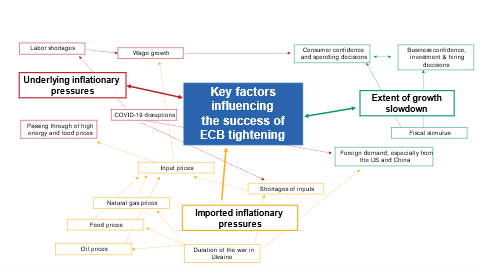
July 21, 2022 | Article
The European Central Bank (ECB) sets monetary policy for countries that use the euro; together, these countries are referred to as the Euro Area or Eurozone. Not all countries that are part of the European Union use the euro. While in theory they are obliged to join the Euro Area after meeting certain criteria, in practice EU countries have some flexibility in choosing whether they wish to do so.
Today, of 27 EU members, the common currency bloc consists of 19 economies, with Croatia becoming the 20th in 2023, Bulgaria joining in 2024, and Romania possibly following later this decade.
Soaring inflation in Europe prompted the ECB to begin raising rates for the first time in over a decade in July 2022. When it comes to raising interest rates, it trails other central banks, most notably the US Federal Reserve and the UK Bank of England but is ahead of the Bank of Japan. On its tightening journey, the ECB faces two challenges: it may not be able to rein in inflation, and it may trigger different effects across different Euro Area countries.
While the Euro Area economies share a currency, fiscal policies diverge and growth potential differs across member states. The chances of success for the ECB depend on several factors, many of which the ECB does not have full control over, including labor market developments, shortage of inputs, domestic and foreign demand, and most importantly of all, the duration of the Russian invasion of Ukraine.
For more, please see:
Monetary Policy Tightening in the Euro Area: What Could Go Wrong?

